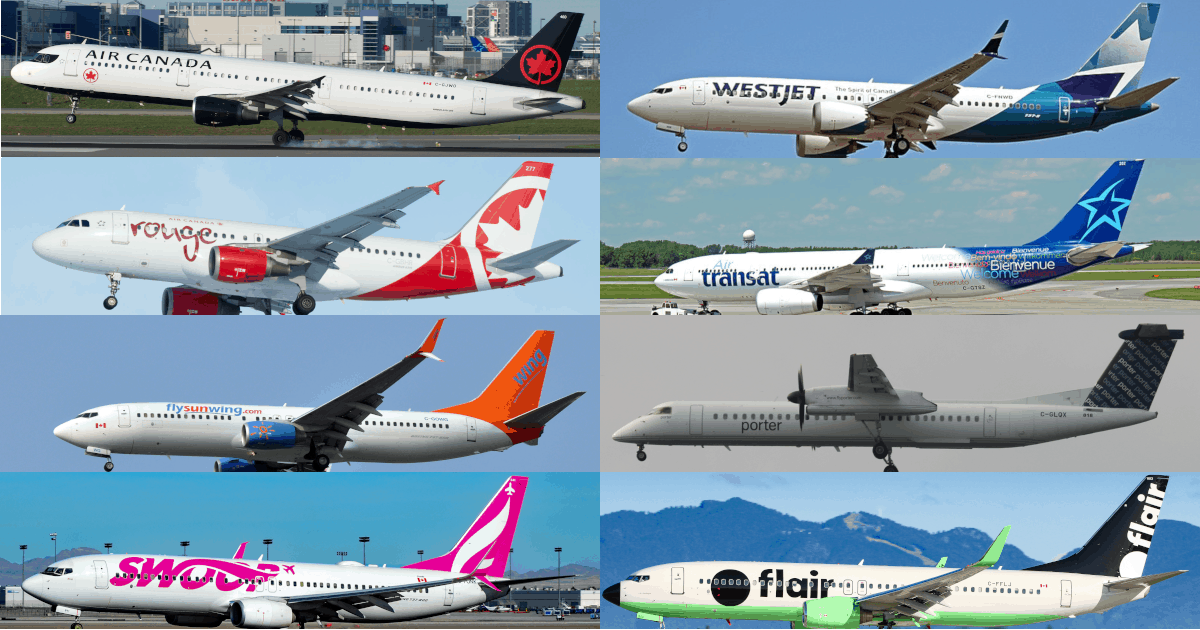This week, we explained that you should obviously be entitled to a full refund in cash if your flight is canceled, not a travel credit like airlines are offering. Unfortunately, this has just changed, at least for Canadian airlines—and for now.
Based on Canadian contractual law (and even specifically based on previous rulings in Canada)… you should be entitled to a refund if your flight is canceled, no matter the cause of the cancelation. It’s simple.
But now, Canadian airlines have the “right” to not give you what you are owed based on a new “decision” announced by the Canadian Transportation Agency.
(The quotation marks are there because this is a debatable “decision” that apparently isn’t really a decision, so there is still hope.)
I can’t say I’m surprised by the “decision”: we only need to look back at the recent Canadian Air Passenger Regulations to see that the government often sides with the airlines instead of the consumers.
But I have to say I am a bit surprised that a major travel agent association formally asked that the rights of their customers—travelers—be disregarded in this way.
Here are the details. And don’t miss Part 2 about how to get a refund for your flight due to the coronavirus. Because yes, you have recourse (subscribe to our free newsletter to not miss a thing).
Previous Rulings About The Right To Refunds
It’s worth taking a quick look at at least two previous official rulings by the Canadian Transportation Agency (CTA), as quoted by The Canadian Press:
- In 2013 (bolding is mine): “it is unreasonable for Porter to refuse to refund the fare paid by a passenger because of its cancellation of a flight, even if the cause is an event beyond Porter’s control.“
- In 2014, the CTA reiterates: “the right of passengers to be refunded for the unused portions of their tickets if the carrier is unable to provide transportation on its services or on the services of other carrier(s) within a reasonable period of time.”
Here’s the last excerpt. WestJet, who has not been offering refunds, has this exact wording in their actual contract of carriage (the contract between the airline and passengers for each flight): “the unused portion of the passenger’s ticket(s) will be refunded” in the same form as it was purchased, “should the alternate transportation proposed by the carrier not meet the passenger’s satisfaction” in the event of a cancellation beyond the carrier’s control.
I am fully aware that the current situation is unprecedented, that’s for sure (I’ll address that below).
But the laws have not changed. Contracts have not changed. And while Thursday’s “decision” isn’t really a decision, those previous excerpts are from specific rulings and are pretty clear. As is general contractual law.
The “Decision” That Was Just Published
Here is the key paragraph from the unsigned release published by the CTA:
“While any specific situation brought before the CTA will be examined on its merits, the CTA believes that, generally speaking, an appropriate approach in the current context could be for airlines to provide affected passengers with vouchers or credits for future travel, as long as these vouchers or credits do not expire in an unreasonably short period of time (24 months would be considered reasonable in most cases).”
Thankfully, it’s not a binding “decision”, it’s just a release. But this definitely legitimizes the airlines’ current credit policies for the time being and lets them keep travelers’ money to try to get through this crisis even if they aren’t entitled to it… I’ll get back to this in a second.
But first… congratulations to all of you who purchased a plane ticket from a Canadian airline: you are now in the business of making interest-free loans to mega corporations worth billions of dollars!
(Whether you want to or not.)
It’s a great timing for this new venture of yours, isn’t it? Especially for the many travelers who have lost income because of this crisis, it’s the perfect time to have non-liquid assets tied up in the industry that’s literally the hardest-hit by this crisis.
All thanks to a public organization whose mandate includes “providing consumer protection for air passengers.”
By the way, the CTA release also includes this exact sentence (bolding is mine):
“On the one hand, passengers who have no prospect of completing their planned itineraries with an airline’s assistance should not simply be out-of-pocket for the cost of cancelled flights.”
Which is logical. And is coherent with past rulings (and contractual law).
But they also, unfortunately, add this:
“On the other hand, airlines facing huge drops in passenger volumes and revenues should not be expected to take steps that could threaten their economic viability.”
Yet that’s what laws say they should do. But the main argument is obviously that if airlines need to return the money to travelers, they’ll go bankrupt.
I get that.
Seriously, I am the first to be extremely sad that airlines and their employees are suffering. I am the most “Aviation Geek” you’ll find and I genuinely love airlines and everything about them.
I explained it all in the first article, in case you didn’t read it.
I completely sympathize. I do.
There’s no doubt airlines are in a disastrous position, but as mentioned, is that a reason to brush aside the legal principle that if you don’t get a service, you’re entitled to a refund?
Is it a reason to keep travelers, some of whom might now be in a more precarious financial situation because of the crisis, from getting the money that clearly belongs to them.
(Some will dare say that those travelers should have planned their finances better… but then the same could be said of airlines in that case—it’s an unprecedented situation for everyone, not just the airlines.)
So, it is a complex issue… I’d love to read your thoughts in the comments below.
Another element is that keeping the money that belongs to travelers probably won’t even be enough to save some airlines, and they will still ask for taxpayer money as well.
Some say that this airline strategy is as much about that than it is about immediate cash flow: by taking travelers’ money hostage they could then use that as an argument to get taxpayer money as a bailout: “if we don’t get money, we will fail and in addition to the many job losses, all travelers will lose their credits”. More people with credits means more people who want the government to help airlines. Probably a bit twisted, but not impossible I guess.
The good news is that according to Christian Nielsen, a passenger rights expert interviewed by The Canadian Press “the Canadian Transportation Agency can only interpret the regulations through decisions, and this is not a decision.”
A passenger rights advocate, Gabor Lukacs, says the same thing: “There is no binding legal decision behind this statement. Have you ever heard of a court issuing a statement without hearing the parties, and without a judge signing it?”
He adds that the unsigned release “lacks the authority of an official ruling, each of which is signed by one or more of the members who comprise the tribunal.”
Hence my quotation marks around the word “decision”… it isn’t quite one.
But the CTA is taking advantage of our regulation being a little vaguer here. If instead of relying on general contractual law, Canada had an explicit rule to protect travelers regarding refunds like in the US and EU (where it’s written word-for-word that you’re entitled to a refund no matter the situation), travelers could more easily assert their rights.
(Yes, even the US protects travelers better than Canada for refunds, which is saying something!)
So by releasing this declaration, the CTA lets the airlines keep travelers’ money for the time being, at the very least buying airlines some time and allowing them to get free financing courtesy of passengers who weren’t able to travel!
The Surprising Position Travel Agents Associations Took
So, as I already said in the first article, refusing to give a refund is a very understandable position for the airlines. Understandable doesn’t mean it’s right… but that’s not their primary concern right now anyway.
But I find a bit less understandable from major associations representing travel agents (like the AAVQ), whose main purpose is to be there to help travelers (at least from the external perspective as someone who has never booked with a travel agent).
Insisting that the government let airlines keep the money travelers are entitled to is quite the opposite of helping.
In terms of an industry positioning, at least in my humble opinion as a former strategy consultant and current travel industry entrepreneur, defending travelers should be the priority. Giving the impression that they are travelers’ allies. That’s a travel agent’s differentiating factor.
First, airlines can pretty much do what they want with their customers, since we’re very captive. Most of us will not decide to switch to a sailboat for our next international trip, it’s just not practical.
In short, there are basically no alternatives, especially in Canada with our disastrous competitive landscape (that will get worse with the Air Transat takeover by Air Canada, as per the Competition Bureau’s report released yesterday—but that’s a topic for another post).
So we’ll all keep giving airlines our business. Okay, maybe a few will prefer to book with US or EU airlines for better protection… but in general, Canadian airlines will essentially always keep the majority of their clientele.
Travel agents, on the other hand, are in a completely different situation. They have to compete with an alternative that is very accessible, convenient, and easy: simply booking on your own.
That’s why it’s surprising to me that they publicly take the airlines’ side to the detriment of their customers, travelers.
We know many travel agents follow us for our deals and other content and we fully appreciate them, let’s be clear. I’ll get back to it, but please do not take this as an attack. Or at the very least read until the end: I have no problems with criticism, as long as you’ve actually read what I wrote.
And I know many travel agents probably disagree with that association’s position as well.
I fully understand that this affects them financially too. I am very well aware. But when the main reason to book with an agent, the added-value of doing that is to have that resource as a traveler and not be on your own… it seems important to me that agents not take the airlines’ side when it’s so harmful to the traveler.
For example, our own site generates revenue from commissions on flights booked, so we can keep the flight deals we spot free for everyone. Of course, we’ll lose that commission if you get a refund, and of course we too would like to keep that revenue… but to keep our credibility and think long-term, we feel we have no other option but to recommend you get a refund instead of a credit, because that is what is absolutely in your best interest (for the many reasons enumerated this week).
Our mission is to help you travel more for less, and having an airline credit will undoubtedly cost you more than getting your money back. So even if it’s detrimental to us, we recommend you get a full refund.
My point is, this is exactly why we always tell you that if you want something done right, do it yourself! Knowing your rights and staying informed on your own is vital! Just because you booked with an agent doesn’t mean they’ll put your interests before theirs—even if obviously many do. For those who don’t, it’s human nature; it’s completely understandable and normal.
The only way to be 100% sure that someone is looking out for you is to be that someone yourself!
And by the way, before you take this as an attack on travel agents when it’s not at all (people seem particularly on edge online these days, maybe it’s the abundance of free time in self-isolation!), I am just sharing this surprising position travel agent associations took to inform you, I have absolutely nothing against travel agents.
I only have something against those who say that travel agents are necessary, because that’s just not true. Or against those who try to scare people into thinking it’s “dangerous” to not book with a travel agent (I hate scare tactics).
And most importantly it’s just not true—I can attest to it after 300+ flights and 60 countries without a travel agent and without a problem.
It’s not necessary to use one, but it’s a necessary offering, because it certainly fills a need! There are plenty of different types of travelers, and travel agents are part of the available assortment of services.
They are definitely useful, notably for those who don’t want to be involved in the planning or booking, or those who don’t have the time. And others.
In short, it’s great that there is a range of different services. It’s always good that consumers can choose.
It’s true in terms of how to book a trip, it’s true in terms of airlines allowing you to pay less by not bringing bags… being able to choose can never be a bad thing and defending consumers should be about defending their ability to choose (and to have options).
So as much as it’s great that travelers can choose to use a travel agent or not, it’s also why for travel credits, it would be a lot fairer to give travelers the choice to take a credit if they want to support the industry… or to get their money back if their own financial situation does not allow them to help anyone else but themselves.
Looking out for number one should be every traveler’s priority. Just like it’s the priority for airlines—and travel agents—to think of themselves first.
My personal philosophy of never relying on anyone else that has always served me very well in my dozens of trips is worth considering I think!
What do you think?
For your options about what to do following this new “decision”, don’t miss tomorrow’s article.
Want to get all our content for Canadian travelers?
Summary
The new statement legitimizes travel credits instead of the refund you should be entitled to, at least for Canadian airlines. It is contrary to previous rulings and general contractual law, and it was surprisingly supported by major travel agent associations, not just by the airlines that benefit greatly from this significant liquidity during this time of crisis.
How do you feel about this situation? Let us know in the comments below!
Photo credit—featured image:
- Air Canada (Wikimedia Commons)
- WestJet (Wikimedia Commons)
- Air Canada Rouge (Wikimedia Commons)
- Air Transat (Dennis Jarvis)
- Sunwing (Wikimedia Commons)
- Porter (Wikimedia Commons)
- Swoop (Wikimedia Commons)
- Flair (Wikimedia Commons)





Great article! My beef with the credit is that it’s a one shot thing, not a true credit. I have a ‘credit’ for $1800…I think I should be able to use that for say, 3 cheaper flights to other places someday. But I can’t. If I buy a $500 ticket to somewhere, I forfeit the remainder.
One of the many reasons why the vouchers are lousy, yes 🙁
There has to be a way to fight this policies change but they agreed in writting to give us our money back that has to count for something we area group of 20 people
This is great information and much appreciated. As individuals, there is little we can do to change what is seen as unfair for the consumer. As a group however, we can push for changes. It is appreciated that all stakeholders; airlines, travel agents, and consumers are impacted by this pandemic. Asking that we be treated fair is the least the industry can agree to undertake. Suggestions that if credit for future travel be taken, the purchaser be protected and not subject to increased costs should prices rise. You get the same package for the same price, or less. The time to reuse the credit should be for 24 months. We initially were told by airlines six months then twelve. Now hearing 24 months but not for those who have settled for 6 or 12. Appreciating the travel world was in a spin the past couple of days but there needs to be consistency. The credit should be used on any route that the specific airline flys.
For those where a credit is not the answer and a couple of excellent examples are noted in this blog, above ( Bev, C Ansell and Christine Saucier for example) the airlines need to use some common sense and refund. Let me state I am in full agreement that refunds for all that request same but the noted examples stand out a s ridiculous decisions by the airline. These are situations that need to be pushed up the line to those who make decisions regarding the airlines. It seems from my reading that CTA is afraid to make a decision so is wishy-washy. They should state reasoning for any statements made ( as they are not decisions) Lobbying by these airlines is what results in the decisions being forced upon us. As a group, Canadians, we need to lobby for fairness.
To be fair, I travel on a frequent basis and have found that the Passenger Bill of Rights works when a problem surfaces. The airlines are trying to get this Bill changed. Canada has some excellent consumer advocates that have successfully pushed for changes to benefit consumers. I look forward to seeing what takes place in coming days.
Thanks for this article. I couldn’t agree with you more! I also have an upcoming flight booked and although I would like to think that we could use the credit within 24 months, the future of travelling is very uncertain… I believe there will be lots of changes and restrictions on travelling in general as a result of Covid-19
I find this typical of the Canadian airline industry. It does not respect its passengers and treats them extremely poorly. Unfortunately, there is not much opportunity to go elsewhere unless you are near a border to the US. I have travelled through Buffalo, Cleveland and Rochester to get better deals. The Canadian Transportation Agency brought in new regulations but they don’t help at all. When flying out of London to return to Canada, I was delayed overnight and received Euro866 to spend towards future travel, and I could have taken a lesser amount in cash – all due to the EU Regulations. When delayed overnight on a return flight from Mexico, all I got was a voucher for 25% off of the airline portion (not taxes) for use within 18 months. But it was impossible to use if Air Canada had a code share with another airline which it seems is pretty much all the time. So I got no compensation and this problem was due to the fact that the flight crew could not fly until they had had a certain length break. This was a scheduling problem which Air Canada knew about. I was supposed to leave for Japan on April 12 to meet a friend who was living there. As she has now returned to Canada, I do NOT want to go to Japan. Does Air Canada think it can make me or force me to lose the cost of the flight $1106. It is totally unacceptable. Can we sue?
The decision is unconscionable! You have stated it well.
My father goes to Florida from Jan 1st to Apr 1st. I had a ticket to go for Mar 24. Now I have a credit but the problem is I have to be back by Dec 31 of this year and I have to go to Florida. If my father isn’t I can’t go. I would be ok with a credit if I had 2 years and/or could go somewhere else. If it costs more I pay the difference.
Totally wrong and illegal.
And soon these corrupt airlines will be asking for federal handouts.
Not one dime until they refund our money being kept hostage.
Contact the Minister of Transportation Marc Garneau.
My flight is scheduled to depart Apr 27. If it’s a no go (which is what it is looking like), I’ll be pushing for a refund. I refuse to accept credit that I may not use in time and through no fault if my own. If I cancel, I can understand accepting credit. If the airline cancels, they owe me my money.
Like many others I was stranded in the UK and decided I had to get home to Canada.
I have a 30% off Promo code and a $500 e voucher as a result of a cancelled flight last year from Air Canada.
On Air Canada’s website I found flights on 20 March for £423, I decided to take that fare, however as soon as I applied the promo code the fare disappeared and the same flight was now over £1100. So the promo code and e voucher ended up in a more expensive ticket. Is this not price gouging?
I bought the original ticket for £423. It leaves a sour taste in your mouth to be ripped off like this.
Hi Andrew, Just want to say thanks for your very balanced and informed articles on the refund issue. I am one of those customers who have been offered a 24 month credit for an Air Canada vacation I booked many months ago and was scheduled to leave tomorrow. Yesterday, I followed your advice and have requested a full refund based on the reasons you provided. With the new “decision”, which ironically I heard about immediately after I submitted my written request, it appears this will be a challenge. In any event, I look forward to your next article on this. Keep up the great work. I love this website!
I’m disgusted by this whole thing. Personally we had a trip booked for 33 people to celebrate marriage. Many of these people have been laid off!!! Air transat will only offer restrictive credits!! Same trip, same group, if it costs more pay up if it costs less too bad! Some of our people are those that have never travelled before! Some had cancellation insurance and were denied!! We all have kids leaving for post secondary education in the fall. They won’t be travelling. This was to be a last hurrah!!! How the hell are we supposed to be able to use the credit!! Ridiculous!!!
Thank you for all your research into our rights. I feel that if Canada allows airlines to indiscriminately offer credits instead of rightful refunds, then those credits should at the very least of no expiration date